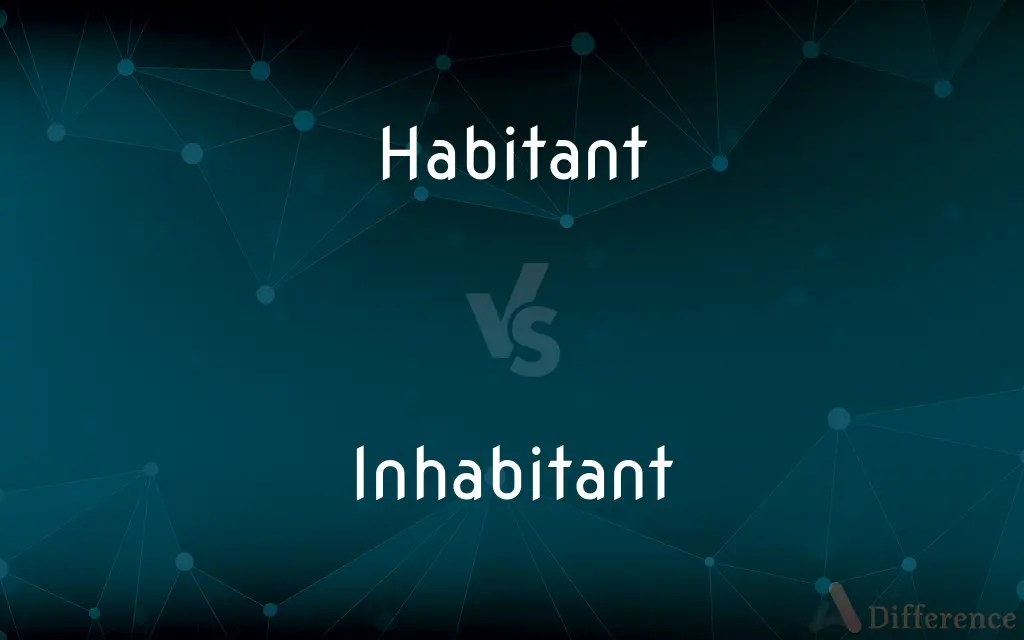Habitant vs. Inhabitant — What's the Difference?
By Tayyaba Rehman & Maham Liaqat — Updated on March 27, 2024
Habitant refers to a resident, often of a rural or historical context, emphasizing local culture, while inhabitant denotes any individual living within a certain area, without cultural connotations.

Difference Between Habitant and Inhabitant
Table of Contents
ADVERTISEMENT
Key Differences
Habitant is a term that traditionally has been used to describe people residing in specific regions, especially in historical or rural contexts, often carrying connotations of local customs and cultures. Whereas, the term inhabitant is more generic, referring to any person or creature living in a specified area, regardless of the duration or cultural implications.
Habitants are often associated with a sense of belonging to a particular place, highlighting their deep-rooted connection to their surroundings and a lifestyle that reflects the area's heritage. On the other hand, inhabitants might simply live in a location without such deep cultural or historical ties, indicating a broader, more inclusive definition.
The term habitant has a quaint or antiquated flavor, suggesting a closer, perhaps more harmonious relationship with the land and community. In contrast, inhabitant is a neutral term that applies to urban, suburban, and rural dwellers alike, without implying any particular relationship with the environment.
In literature and historical documents, habitants are frequently depicted as integral parts of their landscapes, embodying the traditions and values of their communities. Inhabitants, however, are often mentioned in a more detached manner, emphasizing their presence in a location without delving into cultural or historical significance.
While habitant is less commonly used in modern language, serving more as a historical or cultural reference, the term inhabitant remains widely used in various contexts, from legal documents to everyday language, reflecting its versatility and broad applicability.
ADVERTISEMENT
Comparison Chart
Definition
Refers specifically to people in rural or historical contexts.
Denotes any person living in a specified area.
Connotation
Carries cultural or historical connotations.
Neutral, without specific cultural implications.
Usage Context
Often used in historical, cultural, or rural discussions.
Used broadly in various contexts including legal, social, and everyday language.
Relationship
Implies a deep connection with land and local traditions.
Indicates living in a location without implying a deep cultural connection.
Frequency
Less common, with a quaint or specific usage.
Commonly used in modern language across multiple contexts.
Compare with Definitions
Habitant
A term often associated with early settlers or farmers,
The habitants worked the land with age-old techniques.
Inhabitant
A term used without regard to the duration of stay,
She became a permanent inhabitant of the coastal town.
Habitant
Someone who embodies local traditions,
As a habitant, he knew every folk song by heart.
Inhabitant
Any person or creature living in a specified place,
The forest is home to many inhabitants, including rare birds.
Habitant
Reflects a connection to a specific geographical area,
The habitants of the island maintained traditional fishing methods.
Inhabitant
Applies to both urban and rural settings,
The inhabitants of the city come from diverse backgrounds.
Habitant
A resident of a rural or historically significant area,
The habitants of the village shared a strong sense of community.
Inhabitant
Utilized in formal and informal contexts,
The law applies to all inhabitants of the region.
Habitant
A word denoting a person living in a specific locale, historically used,
The habitants of New France were known for their resilience.
Inhabitant
Indicates presence without cultural implications,
The apartment was previously occupied by an unknown inhabitant.
Habitant
An inhabitant.
Inhabitant
One that inhabits a place, especially as a permanent resident
The inhabitants of a fishing village.
Snakes, lizards, and other inhabitants of the desert.
Habitant
Also ha·bi·tan (ă′bē-täɴ) An inhabitant of French ancestry living in Canada, especially Quebec, or in Louisiana.
Inhabitant
Someone or thing who lives in a place.
Habitant
(Canada) a member of habitation colony at Stadacona founded by Samuel de Champlain, where Quebec City now lies
Inhabitant
Resident
Habitant
(archaic) Inhabitant, dweller.
Inhabitant
One who dwells or resides permanently in a place, as distinguished from a transient lodger or visitor; as, an inhabitant of a house, a town, a city, county, or state.
In this place, they report that they saw inhabitants which were very fair and fat people.
Habitant
An inhabitant; a dweller.
Inhabitant
One who has a legal settlement in a town, city, or parish; a permanent resident.
Habitant
An inhabitant or resident; - a name applied to and denoting farmers of French descent or origin in Canada, especially in the Province of Quebec; - usually in the plural.
The habitants or cultivators of the soil.
Inhabitant
A person who inhabits a particular place
Common Curiosities
How does an inhabitant differ from a habitant?
An inhabitant refers to any person living in a particular area, without the cultural or historical connotations often associated with habitants.
Can the term habitant be used in modern contexts?
While habitant can be used in modern contexts, it is less common and usually refers to specific historical or cultural settings.
Are inhabitants always human?
No, inhabitants can refer to any living beings, including animals and plants, residing in a specific area.
How are habitants depicted in literature?
In literature, habitants are often depicted as embodying the traditions and values of their communities, with a close relationship to the land.
How do the connotations of habitant and inhabitant affect their usage?
The cultural and historical connotations of habitant limit its usage to specific contexts, while inhabitant's neutrality makes it widely applicable.
What makes an inhabitant different in urban contexts?
In urban contexts, an inhabitant refers to anyone living in the city, without implying any specific relationship to the culture or history of the place.
Does the term habitant imply a permanent residence?
Habitant often implies a long-term or permanent connection to a place, but not necessarily in a legal sense.
What is a habitant?
A habitant is a person residing in a specific, often rural or historical, area, typically with a deep connection to the local culture and traditions.
Can someone be an inhabitant without being a habitant?
Yes, one can be an inhabitant by simply living in a place, without the deeper cultural or historical connections associated with being a habitant.
Is it correct to use inhabitant for temporary residents?
Yes, inhabitant can be used for both temporary and permanent residents of a place.
Which term is more commonly used in official documents?
Inhabitant is more commonly used in official documents due to its broad applicability and neutrality.
Is there a difference in the cultural significance between habitants and inhabitants?
Yes, habitants often carry cultural or historical significance, reflecting a deeper connection to a place, whereas inhabitants simply denote presence in a location.
Can the term habitant apply to modern rural dwellers?
While it can, habitant is more commonly associated with historical or traditional rural dwellers.
Do both terms have legal implications?
Inhabitant has broader legal implications, often used in laws and regulations, whereas habitant is more culturally and historically specific.
Do the terms have any overlap in meaning?
There is some overlap; both terms refer to people living in a specific area, but the connotations and implications of each term differ.
Share Your Discovery

Previous Comparison
Bread vs. Toast
Next Comparison
Key vs. KeycardAuthor Spotlight
Written by
Tayyaba RehmanTayyaba Rehman is a distinguished writer, currently serving as a primary contributor to askdifference.com. As a researcher in semantics and etymology, Tayyaba's passion for the complexity of languages and their distinctions has found a perfect home on the platform. Tayyaba delves into the intricacies of language, distinguishing between commonly confused words and phrases, thereby providing clarity for readers worldwide.
Co-written by
Maham Liaqat













































